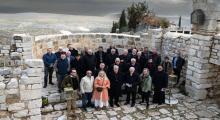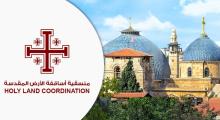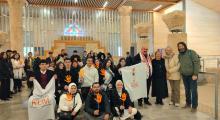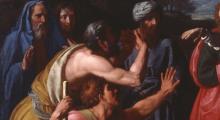Issued by the Catholic Center for Studies and Media - Jordan. Editor-in-chief Fr. Rif'at Bader - موقع أبونا abouna.org

Following is the text of the meditation by Latin Patriarch of Jerusalem His Beatitude Pierbattista Pizzaballa for the 16th Sunday of ordinary time, year B, July 18, 2021:
We could say that the passage of today’s Gospel is an “inconvenient” piece: Inconvenient for the disciples, who return from their mission presumably tired and who, despite Jesus’ invitation to find a little rest, find themselves instead a little more caught with the people.
But inconvenient also to “understand”: how do we reconcile the disciples’ need with that of the people? Why does Lord Jesus offer a time of intimacy to His own, but immediately after does nothing to rescue them and take them away from the onrush of the crowd? How do we reconcile these two things?
If we listen well here, actually, these are questions that closely affect our lives, our needs, our desires. And they bring us back to a desire of the Lord, to a need to remain with Him who is never entirely contented, and who, above all, is always dedicated in some way to open Himself to others.
A true encounter with the Lord that does not make room for the need of a brother does not exist.
Therefore, Jesus welcomes His own back from their mission; and He welcomes them by inviting them to an intimate experience. To tell of this intimacy, Mark uses two expressions.
The first is “aside” (Mk 6:31), and it is a term that recurs at different times in Mark: When Jesus, taking aside His disciples, explains to them the meaning of the parables (4:34); when He brings Peter, James and John up on Tabor (9:2); when His disciples have questions a bit challenging to put to Him and do not want to do so in the presence of all (9:28; 13:3). In the personal and intimate relationship that binds Jesus to His disciples, this “aside” returns, this space, where friendship is nurtured and deepened, a space of listening and sharing, a space of mutual knowledge. The term, “aside”, is therefore linked to an experience of revelation that the Lord makes of Himself to His disciples.
The second term is “desolate place” (Mk 6:31): the place apart where Jesus guides them is a place of retreat, a desolate place, a solitary place. Well, the desolate place has never been for anyone a place to relax: it is, instead, the place of struggle, of thirst and hunger, of temptation and journey: it is the place that God chooses so that His people may grasp the demanding art of trusting and sharing.
What is surprising, what is inconvenient, is that this desolate and place apart is not an isolated space to the point of being inaccessible. Indeed, on the contrary: it becomes the place where it is even easier for the people to reach them, to the point that (the only other time in Mark), directly preceding Mark 6:33, the people can find them just there, in this isolated and set apart place.
And it happens here that Jesus and the disciples are simply called to welcome them, to feel the hunger of the people, to bear the burden of their search for life. They are called to find rest not so much in a quiet solitude, as much as in an inconvenient welcome of the other.
In the deserted place, aside, one does not however go there to relax, but to open oneself to a thirst and hunger deeper than one’s own: and it is this experience that gives meaning, vigor, and strength to life. This experience is called compassion (Mk 6:34).
Therefore: the desire of Jesus to be with His own is true; Jesus’ intuition is true, which would like to be for His disciples a time of tranquillity.
But it is also true that Jesus knows that this desire is not achieved only by creating space, together in a numerous crowd, in their hunger. Only this truly gives rest.
Every escape from reality, from others, not only is it not a source of rest, but, on the contrary, it is the source of tiredness, nervousness, frustration. Who knows how much of our fatigue is due to a non-Gospel search for rest, to an incorrect search for relationship with the Lord.
The struggle that the disciples are called to make in the deserted place is then precisely this transition, this opening in creating space for a Lord who does not belong to them except in the sharing of His very passion for man.
And the revelation linked to being “aside” this time is not so much about the Lord, as the mission of the disciples: they left and they returned, but their return does not mean that the mission is over, nor that it can be allowed a break; just as man’s hunger does not have a pause, nor is there a pause in God’s desire that His Kingdom draws near.
+Pierbattista







